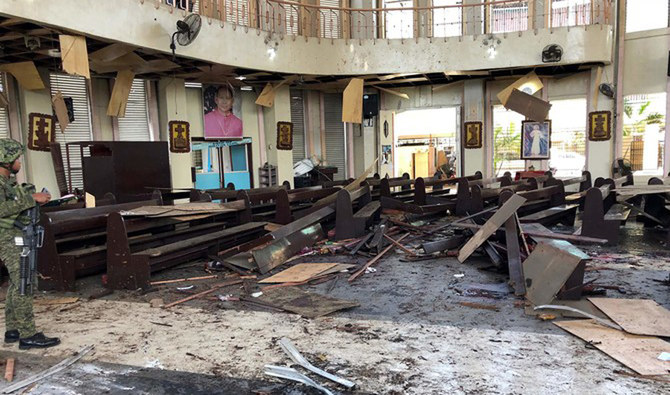Insurgent groups in the southern Philippines have not included suicide bombings despite a long history of terrorist violence

Inside the damaged Catholic cathedral, where two bombs exploded, in Jolo, Sulu on January 27, 2019. (WESMINCOM Armed Forces of the Philippines via AP/File)
MANILA: Daesh’s operations in East Asia from its southern Philippines base “may not be large, but remain persistent,” the US Department of Defense warned.
In its third-quarter report to Congress tabled on Tuesday, Operation Pacific Eagle-Philippines, the US counterterrorism effort in the country, said that there had been little change in the extremist group’s size, strength, capabilities or activities in the region.
Citing unclassified information, it said that Daesh in the Philippines comprises about 500 individuals, mostly members of long-standing local insurgent outfits that have adopted the terror group’s “brand.”
The report said that Daesh’s East Asian unit is “currently capable of conducting only small-scale or suicide attacks on Jolo, Sulu and Mindanao islands in the southern Philippines.”
“Daesh’s lack of network cohesion, international support, internal leadership and adequate financing have impeded its ability to conduct activities outside its base of operations or carry out large-scale attacks,” it added.
However, it warned that suicide bombings were increasing in the country, citing the case of a female suicide bomber who blew herself up outside a military base in Indanan Sulu on Sept. 8.
“Philippine insurgent groups have not historically used suicide attacks, but this appears to be changing,” the report said.
It pointed out that while the southern Philippines has a long history of terrorist violence, it has not historically included suicide bombings.
However, a series of suicide attacks this year has forced Philippines defense officials to reevaluate security protocols in light of the new threat.
“Most suicide attacks in the Philippines have been conducted by foreign nationals who attempted and failed to travel to the conflict zone in Syria and Iraq, and were likely radicalized before traveling to the Philippines,” the report said.
Daesh ideology and its emphasis on suicide attacks “has not resonated broadly among the Philippine population but has permeated some Daesh factions, particularly in the Sulu archipelago,” it added.
Daesh in the Philippines has been without a leader since the death of Isnilon Hapilon in the 2017 Marawi siege, the report said.
“Hatib Hajjan Sawadjaan, the leader of a large faction of the Abu Sayyaf Group, has declared himself ‘emir’ of Daesh in the Philippines, but the Daesh core has not publicly recognized him as it did Hapilon,” it said.

No comments:
Post a Comment
Note: Only a member of this blog may post a comment.